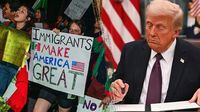President Donald Trump is once again thrusting the question of who gets to be an American citizen into the national spotlight, as his administration pushes the U.S. Supreme Court to weigh in on a controversial executive order that would dramatically restrict birthright citizenship. This legal and political battle, which has been brewing since Trump’s first day in office, could reshape a constitutional guarantee that has stood for over a century.
It was in June 2025 that Trump hailed a “monumental victory” after the Supreme Court rolled back nationwide injunctions that had blocked his executive order aiming to end automatic citizenship for children born on U.S. soil to non-citizen parents. But the celebration was short-lived. By September, two separate federal courts had again blocked the order, this time on different grounds, setting the stage for the administration’s latest maneuver: an urgent plea to the Supreme Court for a definitive ruling by next summer.
Solicitor General John Sauer, in filings reviewed by ABC News and CNN, argued that the current interpretation of the Fourteenth Amendment is “mistaken” and has had “destructive consequences.” He wrote, “The government has a compelling interest in ensuring that American citizenship—the privilege that allows us to choose our political leaders—is granted only to those who are lawfully entitled to it.” Sauer’s petition further contends that lower court decisions “confer, without lawful justification, the privilege of American citizenship on hundreds of thousands of unqualified people.”
At the heart of this dispute is the 14th Amendment’s Citizenship Clause, ratified after the Civil War, which famously states that all “persons born or naturalized in the United States, and subject to the jurisdiction thereof, are citizens of the United States and of the state wherein they reside.” For generations, courts and government agencies have interpreted this to mean that virtually everyone born on U.S. soil—regardless of their parents’ immigration status—is a citizen.
Trump’s executive order, signed the day he took office in January 2025, takes a sharply different view. It declares that only newborns whose parents have permanent legal status are “subject to the jurisdiction” of the United States and thus eligible for citizenship. The stakes are enormous: According to the Penn State Social Science Research Institute, an estimated 255,000 children are born each year in the U.S. to one or more parents without American citizenship or permanent legal status.
For now, the administration has held off enforcing the executive order, awaiting the Supreme Court’s decision on whether to take up the case. That decision could be months away, and the outcome—whichever way it goes—promises to send shockwaves through American law and politics.
The legal precedent on this issue is clear, at least for now. In 1898, the Supreme Court decided United States v. Wong Kim Ark, ruling that a man born in San Francisco to Chinese parents—who were barred from becoming citizens themselves—was nonetheless a U.S. citizen by birth. That case cemented the principle of “jus soli,” or citizenship by birthplace, with narrow exceptions for the children of diplomats, foreign occupiers, and sovereign tribal nations.
But the Trump administration and its supporters argue that the 14th Amendment’s phrase “subject to the jurisdiction thereof” leaves room for a narrower interpretation. John Eastman, who advised on drafting the order, told Fox News Digital, “Hurrah for Solicitor General Sauer for expeditiously seeking Supreme Court review of the Ninth Circuit’s decision blocking President Trump’s executive order restoring the original meaning of the 14th Amendment’s citizenship clause. The people who drafted and ratified that clause never intended to confer automatic citizenship on the children of temporary visitors, and certainly not to the children of illegal aliens. The historical record is clear, and I look forward to the Supreme Court restoring the original meaning of the clause.”
Supporters of the order insist that the Constitution requires both birth on U.S. soil and “complete” jurisdiction, meaning full and lawful political allegiance to the United States—not just physical presence. They point to the amendment’s historical context, arguing that its drafters borrowed British “jus soli” traditions but intended to prevent automatic citizenship for children of those with only temporary or unlawful ties to the country.
On the other side, critics maintain that the text and history of the 14th Amendment are unambiguous. John Yoo, a UC Berkeley law professor, has written that “it is simply beyond doubt that the Framers operated by borrowing and adopting common law principles … to adopt an interpretation that rejects that meaning, we would want to see historical evidence that the Framers had adopted a radically new interpretation.”
Legal experts warn that a Supreme Court ruling in Trump’s favor would be nothing short of seismic. James Sample, a Hofstra Law professor and constitutional scholar, told ABC News, “The reliance interest for all of the people who are already here in the United States to whom birthright citizenship is a cherished right, and for the nation prospectively – this would be an earthquake if the Supreme Court were to rule in Trump's favor. I don't see that happening.” He added, “On a political level, however, Trump likely sees this as favorable ground in the sense that even if he loses on the law, even if he loses in the Supreme Court, many of his political allies would see this as the kind of red meat political fight that they relish, and he would love to run against a loss.”
The order’s critics have not minced words. Cody Wofsy, deputy director of the ACLU’s Immigrants’ Rights Project, declared, “This executive order is illegal, full stop, and no amount of maneuvering from the administration is going to change that. We will continue to ensure that no one baby's citizenship is ever stripped away by this cruel and senseless order.” Devon Chaffee, executive director of ACLU-NH, warned, “This executive order directly opposes our Constitution, values, and history, and it would create a permanent, multigenerational subclass.” Karla McKanders of the NAACP Legal Defense Fund’s Thurgood Marshall Institute called the order “an unlawful attempt to entrench racial hierarchies,” emphasizing, “Citizenship is a right afforded to us by birth, not by privilege.”
The legal wrangling has been intense. In July 2025, a federal judge in New Hampshire ruled that Trump’s order “plainly appears to violate the Constitution” and blocked its enforcement in a class-action suit. A separate federal appeals court also blocked enforcement nationwide, prompting the administration to seek a Supreme Court review of both cases.
Justice Sonia Sotomayor, in a June 2025 Supreme Court dissent, suggested that class actions could be a viable path for challengers, writing, “parents of children covered by the Citizenship Order would be well advised to file promptly class action suits … and lower courts would be wise to act swiftly.”
As the Supreme Court weighs whether to hear the case, the nation is left in suspense. The outcome could redefine the very notion of American citizenship, with consequences for hundreds of thousands of children and their families. For now, all eyes are on the justices—and the future of the 14th Amendment’s promise.


